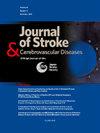Burden of perceived stress among stroke survivors in Ghana: Insights from a multicentre, cross-sectional study
IF 1.8
4区 医学
Q3 NEUROSCIENCES
Journal of Stroke & Cerebrovascular Diseases
Pub Date : 2025-05-28
DOI:10.1016/j.jstrokecerebrovasdis.2025.108365
引用次数: 0
Abstract
Introduction
Stroke incidence is rising rapidly in low- and middle-income countries, including Ghana. Stroke survivors face significant challenges in daily life, heightening their risk for stress. This study aims to examine the burden of perceived stress and its associated factors among stroke survivors in Ghana.
Methods
This cross-sectional study analysed baseline data from 486 recent stroke survivors enrolled within 1 month of stroke onset, across ten hospitals in Ghana. Perceived stress was measured using the 4-item Perceived Stress Scale (PSS-4). Associations between variables and perceived stress were analysed using Fisher's exact test, Wilcoxon rank sum, and Pearson's Chi-squared test. Binary logistic regression was performed to determine factors associated with perceived stress.
Results
204 (42.0%) of study participants experienced high perceived stress. Stroke severity (measured by the NIH Stroke Scale) and depression were significantly associated with high perceived stress. For each unit increase in the NIH stroke score, the odds of high perceived stress increased by 14% (AOR = 1.14, 95% CI = 1.08, 1.20; p = 0.001). Survivors with moderate to severe depression were five times more likely to experience high perceived stress compared to those without depression (AOR = 4.75, 95% CI = 1.90, 13.1; p < 0.001).
Conclusion
4 out of 10 recent Ghanaian stroke survivors experience high psychological stress strongly associated with stroke severity and depression. These findings emphasise the need for integrating psychological support and stress management into comprehensive stroke care programs in Ghana and similar resource-limited settings.
加纳中风幸存者的感知压力负担:来自多中心横断面研究的见解。
在包括加纳在内的低收入和中等收入国家,脑卒中发病率正在迅速上升。中风幸存者在日常生活中面临重大挑战,增加了他们的压力风险。本研究旨在研究加纳中风幸存者的感知压力负担及其相关因素。方法:这项横断面研究分析了486名新近中风幸存者的基线数据,这些患者在1个月内中风发作,来自加纳的10家医院。知觉压力采用4项知觉压力量表(PSS-4)进行测量。使用Fisher精确检验、Wilcoxon秩和和Pearson卡方检验分析变量与感知压力之间的关系。采用二元逻辑回归来确定与感知压力相关的因素。结果:204名(42.0%)的研究参与者有高感知压力。卒中严重程度(由NIH卒中量表测量)和抑郁与高感知压力显著相关。NIH卒中评分每增加一个单位,高感知压力的几率增加14% (AOR = 1.14,95% CI = 1.08,1.20; = 0.001页)。中度至重度抑郁症幸存者与无抑郁症患者相比,高感知压力的可能性高5倍(AOR = 4.75,95% CI = 1.90,13.1;P < 0.001)。结论:最近10名加纳中风幸存者中有4人经历与中风严重程度和抑郁症密切相关的高心理压力。这些发现强调了在加纳和类似资源有限的环境中,需要将心理支持和压力管理整合到综合中风护理项目中。
本文章由计算机程序翻译,如有差异,请以英文原文为准。
求助全文
约1分钟内获得全文
求助全文
来源期刊

Journal of Stroke & Cerebrovascular Diseases
Medicine-Surgery
CiteScore
5.00
自引率
4.00%
发文量
583
审稿时长
62 days
期刊介绍:
The Journal of Stroke & Cerebrovascular Diseases publishes original papers on basic and clinical science related to the fields of stroke and cerebrovascular diseases. The Journal also features review articles, controversies, methods and technical notes, selected case reports and other original articles of special nature. Its editorial mission is to focus on prevention and repair of cerebrovascular disease. Clinical papers emphasize medical and surgical aspects of stroke, clinical trials and design, epidemiology, stroke care delivery systems and outcomes, imaging sciences and rehabilitation of stroke. The Journal will be of special interest to specialists involved in caring for patients with cerebrovascular disease, including neurologists, neurosurgeons and cardiologists.
 求助内容:
求助内容: 应助结果提醒方式:
应助结果提醒方式:


